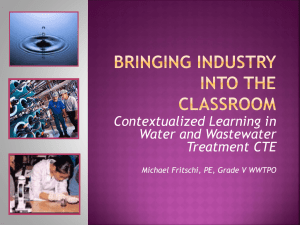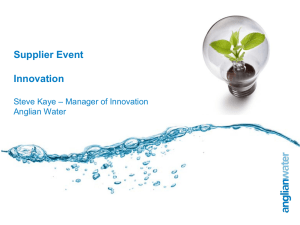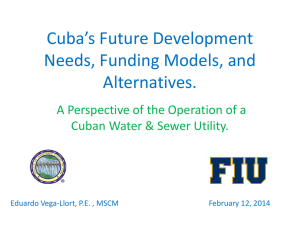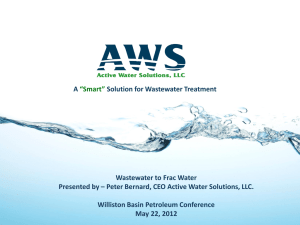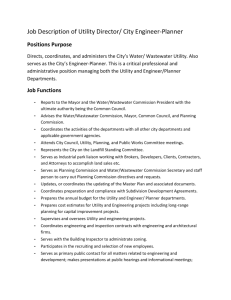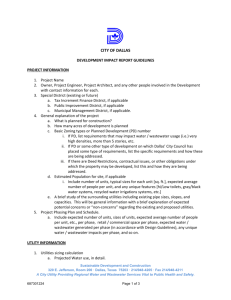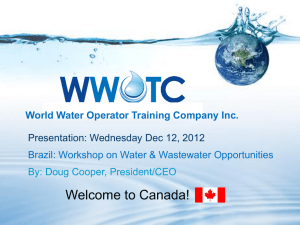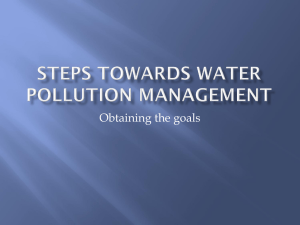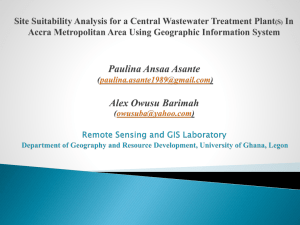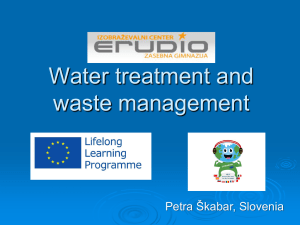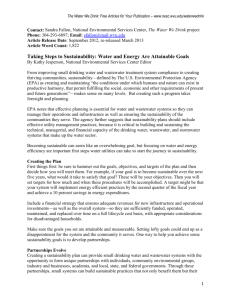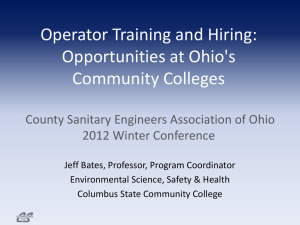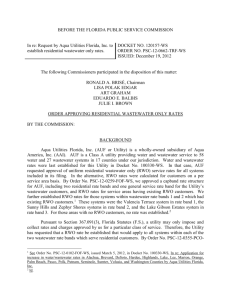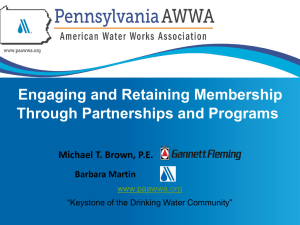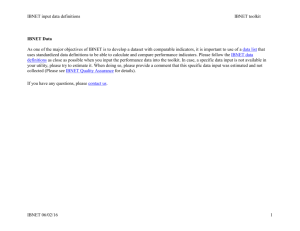The Water Training Institute at WKU
advertisement
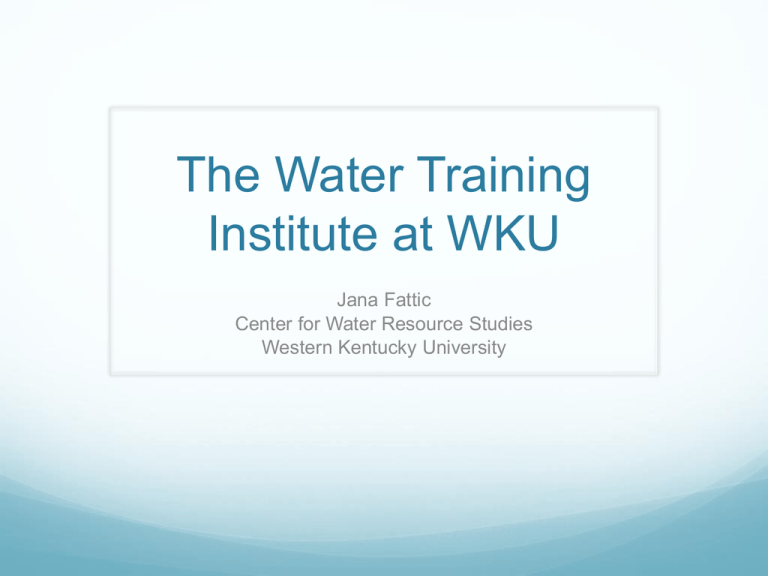
The Water Training Institute at WKU Jana Fattic Center for Water Resource Studies Western Kentucky University Dilbert State of the Industry • Increased need for critical thinking skills • More technical Federal regulations • Increased expectations in occupational and professional competencies • More complex treatment processes • New technologies • Increased automation • Need to elevate perception of operators and their importance NRWA Quotes “Utilities and other companies in the water industry are facing an impending mass exodus of senior workers the likes of which has never before been seen.” “The incoming workforce generation is small, and coupled with their high turnover rate and transient nature, means a shrinking pool of replacements and increased competition for those employees.” AWWA State of the Water Industry Report, 2012 AWWA State of the Industry Report, 2009 “As the industry becomes more complex, there is a lack of quality people entering the field.” Water Sector Competency Model Tier 2: Academics Higher Education • Rural education issues • Cost • Transportation • Lack of emphasis • Community Colleges • Less expensive • Closer to home • Credits transferrable Nationwide Opportunity • Research on water technology programs at community colleges • Over 40 CCs nationwide offer 2-year degrees • Websites with curriculum • Most face-to-face; some on-line Community Colleges with 2Year Water Degrees ATEEC Advanced Technology Environmental & Energy Center Resource center funded by NSF ATE to provide: • Professional development • Program improvement • Curriculum design • Instructional materials development • Online resources clearinghouse ATEEC Mission - To advance environmental and energy technology education through curriculum development, professional development and program improvement. Vision - To foster a network of educational communities, supported through public and private partnerships, that ensures human health, safety, and global sustainability. Water Defining Workshop Approximately 20 SMEs with over 600 years of combined experience in the water industry Brainstorming session to define: Job titles Job functions Workshop Outcomes Field: Water Environment Management Name: Water Professional Duties: Too Many to List! Water Training Institute Core Concepts Partners • Training Providers • Secondary Schools • Higher Education • Industry/Employers • Regulatory Agencies • Trade Associations Problem Statement • Operator certification requires education and on-the-job experience • Workforce needs (treatment plants) in rural areas • Too dispersed to justify development of degree program at local institution Rural Populations Treatment Plant Capacity “The effects of the retiring Baby Boomer generation have been exacerbated in the water industry. Competition for employees entering the workforce from colleges and trade schools is fierce.” American Water Works Association State of the Industry Report, 2008 Significance • Water treatment crucial to: • rural economic development • public and environmental health • Growing industry: 15,000 jobs being created in the next 10 years • Baby Boomers: 50% of operators will retire in next 7 years Motivating Rationale Water Training Institute • 2-year Degree Program • On-line courses; hands-on internship • Associate of Science in Water Resource Management • • • • New and existing operators Can transfer into Bachelors Certificate Program Continuing Education Units (CEUs) Degree Program 60 Hours of Academic Credit 15 Hours – General Education 21 Hours – Science Core 24 Hours – Concentration-Specific 3 Concentrations Water Operations Wastewater Operations Water Utility Management General Education ENG100: Intro to College Writing PS110: American National Government MATH116: College Algebra Category B: Humanities Elective Category C: Social & Behavioral Science Elective Science Core BIOL113: General Biology BIOL207: General Microbiology CHEM101: Intro to Chemistry ENV280: Intro to Environmental Sciences MATH117: Trigonometry GEOG100: Intro to Physical Environment PHYS101: Concepts of Motion Concentration-Specific Drinking Water Operations Track WTTI 200: Water Supply & Wastewater Control WTTI 210: Intro to Water Treatment WTTI 212: Water Distribution and Wastewater Collection WTTI 220: Calculations & Hydraulics for Water WTTI 222: Water & Wastewater Instrumentation & Control WTTI 226: Water Chemistry WTTI 230: Advanced Water Treatment WTTI 291: Internship: Utility Operations Concentration-Specific Wastewater Operations Track WTTI 200: Water Supply & Wastewater Control WTTI 211: Intro to Wastewater Treatment WTTI 212: Water Distribution and Wastewater Collection WTTI 221: Calculations & Hydraulics for Wastewater WTTI 222: Water & Wastewater Instrumentation & Control WTTI 226: Water Chemistry WTTI 231: Advanced Wastewater Treatment WTTI 291: Internship: Utility Operations How? Hybrid Experiential & Distance Learning Educational Model (HEDLEM) Hands-on requirement Internships with local utilities Geographically dispersed need On-line classes and forums Distance Learning • Can include mail, video, Internet • Internet pros • Availability rapidly increasing • Access to multiple electronic learning resources • No travel required • Convenient • Internet cons • Infrastructure required • Must pay for access • Must have a computer • Lack of hands-on experiences Experiential Learning Pros: • Increases employability • Higher pay/responsibility • Increases job satisfaction Cons: • Requires access to physical resources • May require travel • Security/safety issues Hybrid Experiential and Distance Learning Educational Model • Educational component > online • Hands-on component > local utility • On-the-job training • Issues • Internet access • Sufficient workforce recruitment pool • Distance to experiential location Industry Linkages Programmatic Direction – driven by practitioners Steering Committee Employment Sector – DW/WW utilities Trade Associations – local TAs linked to national organizations State Primacy Agencies Educators – WKU, Community Colleges, Training Providers Utility Network (UNet) Local point of presence for students Provide access to local facilities Internships Utility Network The Subversive End: Change the EMPLOYER’s Mindset! Mentor Network On-line network of experienced water professionals Participate in discussion forums Provide expertise to educators Give career guidance to students Mentor Network Student Incentives Internships One college credit hour for every 80 hrs of supervised work-based experience Employer must complete student evaluation form Scholarships Trade Associations Utilities – tuition reimbursement Student Incentives (cont’d.) On-line courses Moving toward independent learning Flexible for existing operators Discussion Forums Modularization – short courses by TA providers 8 hr short course ~ 0.5 academic credit hour Must have assessment tool (quiz) CEU Articulation KY/TN AWWA Water Treatment Distribution KRWA Instructor Credentials Content Equivalency Student Assessment Utility Management 101 Utility Organization, Regulation & Law KWWOA Wastewater Treatment Water Treatment & Distribution TAUD Disinfection and Disinfection Alternatives Gravity Media Filter Optimization The Role of WTI Pathways for Millennials Certificate in Water Ops CEUs Associate: Bachelor: Master: Water Resource Management Technology Mgmt or Public Admin. Technology Mgmt or Public Admin. Certified Operator CEO? Professional Standards Example: Engineering Licensure Water & Wastewater Workforce Setting the Professional Standard Evolving a National Center of Excellence National Replication Model can be extrapolated to other disciplines Laboratory Technician Stormwater Management Energy Management Resource Conservation Model can be franchised to other educational institutions/ training providers Content only Content and instruction Conclusion • More well-trained operators needed throughout the country • Many educational opportunities for operators, even in rural areas • Existing professionals can act as instructors and/or mentors • Meet the needs of rural water systems and jobseekers in those areas It’s a Win-Win! Students • Learn theory and application • On-the-Job training • Competitive edge • Scholarships from trade associations • Tuition reimbursement by utilities • Existing operators receive CEUs Utilities/Internship Providers • Get to ‘test-drive’ students • Get an extra set of hands Dilbert Thank You! Questions? Jana Fattic jana.fattic@wku.edu 270-745-8706


